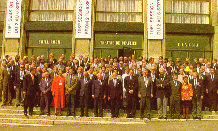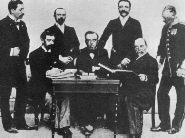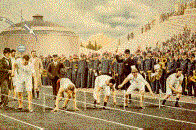
A Journal of Foreign Policy Issues

By Juan Antonio Samaranch, President the International Olympic Committee
It is often said that sport and politics are two aspects of our society that have nothing in common. Yet the history of the Olympic movement has provided several examples of how they influence one another, directly or indirectly.
There can be no doubt that sporting contests, and the Olympic Games in particular, are a reflection of the real world, a microcosm of international relations. Even at the tensest periods of the Cold War, they acted as an indicator of international detente.

In the 1970s the 'ping-pong diplomacy' that followed the encounters arranged between American and Chinese players enabled the situation to be unfrozen, and paved the way to a dialogue between two countries that did not maintain diplomatic relations.
The IOC happens to be one of the very few international organisations that recognises both the People's Republic of China and Chinese Taipei, so that both nations have been able to compete in the Olympic Games since 1984.
Four years later, in Seoul, the Games of the XXIVth Olympiad exerted a beneficial influence on the process of democratisation that was at that time beginning in Korea. Those Games, too, saw the participation of several countries that did not then maintain diplomatic relations, thus providing a stepping-stone to dialogue.
After a period of repeated boycotts, the Games of the XXVth Olympiad in Barcelona finally brought together athletes from the entire world and enabled South Africa, after an absence of 27 years and following the abolition of the ignoble policy of apartheid, to return to the Olympic movement in the presence of President Nelson Mandela, a personality of universal charisma and the incarnation of the struggle against all forms of racial discrimination. The happiest image of South Africa's return, seen on television screens throughout the world, was the sight of the Ethiopian gold medalist Derartu Tulu and the South African silver medallist Elena Meyer, arms linked in comradeship, performing a lap of honour at the end of the 10,000 metres, as the packed stadium rose to cheer them in a wave of emotion. The IOC also reached an understanding with the states of the former Soviet Union whereby they were able to participate as a single team.
 The Games of the XXVIth Olympiad, the Centenary Games in Atlanta, were the first truly universal ones in the history of the Olympic movement, attended by athletes from all the 197 recognised National Olympic Committees (NOCs). On that same occasion, the IOC, strengthened by its greater independence and international standing, was able to co-operate with the Organising Committee and the US federal authorities to issue a genuine Olympic identity card, which served as a visa for all participants in the Olympic Games, enabling them to enter the United States whatever the latter's diplomatic relations with their countries of origin may have been.
The Games of the XXVIth Olympiad, the Centenary Games in Atlanta, were the first truly universal ones in the history of the Olympic movement, attended by athletes from all the 197 recognised National Olympic Committees (NOCs). On that same occasion, the IOC, strengthened by its greater independence and international standing, was able to co-operate with the Organising Committee and the US federal authorities to issue a genuine Olympic identity card, which served as a visa for all participants in the Olympic Games, enabling them to enter the United States whatever the latter's diplomatic relations with their countries of origin may have been.
More recently, when the Crown Colony of Hong Kong was handed back to Chinese sovereignty, the IOC was able to negotiate an agreement whereby Hong Kong's NOC was able to preserve its independence and its status within the Olympic movement.
Moreover, in recent years, a sense of moral obligation and the desire to serve the international community have prompted the IOC to undertake several further initiatives in the political arena. Thus, in 1992, it Iaunched an appeal for the observance of the Olympic Truce in the interests of dialogue, reconciliation and peace throughout the world. This tradition actually dates back to the ninth century BC, when the Truce -also known by the name 'ekecheiria'- was instituted in Ancient Greece by the signature of an 'international' treaty between three kings: Iphitus of Elis, Cleosthenes of Pisa and Lycurgus of Sparta. Subsequently, all the other Greek cities ratified this agreement, whereby the permanent and recognised immunity of the sanctuary of Olympia and the region of Elis became a reality. This period of truce enabled the athletes and artists, and their families, to enjoy safe conduct to participate in or attend the Olympic Games and then return safely home to their respective countries.
This was the framework within which the IOC succeeded in enabling Yugoslav athletes to attend the Games of the XXVth Olympiad in Barcelona, on certain conditions, despite the embargo imposed by the United Nations Security Council.
 The IOC's appeal was also heard by the United Nations General Assembly, which adopted a resolution in favour of the observance of the Olympic Truce on the occasion of the Winter Olympics at Lillehammer, Norway, and proclaimed 1994 as the International Year of Sport and the Olympic Ideal. Many Heads of State and Government and Foreign Affairs Ministers supported the idea of respecting the Truce. The United nations subsequently reiterated its support for the action of the Olympic movement by unanimously adopting a resolution co-authored by a record 161 states and entitled "To build a peaceful and better world through sport and the Olympic ideal". The terms of this resolution included an invitation to the Member States to respect the Olympic Truce during every Olympics and also a recognition of the contribution made by the Olympic movement, and sport in general, to the harmonious and peaceful development of mankind. On that occasion, I had the honour and privilege, as President of the IOC, of addressing the General Assembly, although our organisation has no recognised status at the UN. Furthermore, a resolution regarding the Olympic Truce will be considered again by the General Assembly on 25 November next in New York and will call for the Olympic Truce to be respected during the XVIIIth Winter Olympic Games at Nagano, Japan, from 7 to 22 February next year.
The IOC's appeal was also heard by the United Nations General Assembly, which adopted a resolution in favour of the observance of the Olympic Truce on the occasion of the Winter Olympics at Lillehammer, Norway, and proclaimed 1994 as the International Year of Sport and the Olympic Ideal. Many Heads of State and Government and Foreign Affairs Ministers supported the idea of respecting the Truce. The United nations subsequently reiterated its support for the action of the Olympic movement by unanimously adopting a resolution co-authored by a record 161 states and entitled "To build a peaceful and better world through sport and the Olympic ideal". The terms of this resolution included an invitation to the Member States to respect the Olympic Truce during every Olympics and also a recognition of the contribution made by the Olympic movement, and sport in general, to the harmonious and peaceful development of mankind. On that occasion, I had the honour and privilege, as President of the IOC, of addressing the General Assembly, although our organisation has no recognised status at the UN. Furthermore, a resolution regarding the Olympic Truce will be considered again by the General Assembly on 25 November next in New York and will call for the Olympic Truce to be respected during the XVIIIth Winter Olympic Games at Nagano, Japan, from 7 to 22 February next year.
At the European level, too, there has been clo-ser co-operation between the IOC and the Community's political institutions. We were very pleased that the Amsterdam Conference, at which the Maastricht Treaty was revised, recognised the social significance of sport, especially its role in the shaping of character and bringing countries closer together, calling upon the institutions of the European Union to consult the sporting associations when important sport-related issues arose.
We are also involved in the annual Forum for Sport in Europe, which has been established under the auspices of the European Union, and in its organising committee, which allows representatives of the NOCs, the European Non-Governmental Sports Organisation and the European Commission to work together.
Similarly, the collaboration that has been established between the IOC and the Organisation for Security and Co-operation in Europe (OSCE) is another source of satisfaction. In its Final Act, adopted in Helsinki in 1975, the CSCE -as it was then named- recognised the contribution made by sport as a major social influence on co-operation between States, and recently invited the IOC to address its members at the sixth session of its Parliamentary Assembly, held in Warsaw last July.
The IOC also maintains working relations with the Organisation of African States, the Organisation of American States and several other intergovernmental organisations.
Numerous co-operation projects have also been instituted with several agencies and programmes of the United Nations, to enable a contribution to be made, through sport and its thousands of voluntary workers, to actions in favour of education, the advancement of health, environmental protection, the campaign against drug abuse, humanitarian aid to societies ravaged by armed conflict and the integration of refugees.
So, since its creation just over a century ago, the International Olympic Committee, in alliance with the other main members of the Olympic movement, the International Federations and the National Olympic Committees, has endeavoured to place sport everywhere in the service of the harmonious development of mankind, in the desire to create a society concerned with the dignity of the individual. The sporting phenomenon, and the Olympic Games in particular, are playing their full part in the globalisation of our society, and especially in the integration of all its components. The Olympic Games are also attracting increasing interest, in particular, for the benefits they bring to the host city, region and country. Eleven cities competed for the honour and privilege of hosting the Games of the XXVIIIth Olympiad in 2004. The city of Athens, a European capital city and the birthplace of the civilisation that created the Olympic movement, was chosen. I have no doubt that the organising committee, supported by the political authorities and by the entire Greek population, will ensure that these Games are exceptional in every way.
They will also help to renovate the image and infrastructures of the city, with the construction of a new airport and an underground railway, the modernisation of the entire transport and telecommunications systems, several new sporting facilities and other major infrastructural projects which will be a valuable heritage for future generations.
Co-operation and harmony through sport thus form one of the cornerstones of modern politics, and a challenge that we must carry forward into the future. It would also be desirable for governments and political parties to include sport as a matter of course in their action programmes, as an essential element in the well-being of their populations.
It is against this background that the IOC is encouraging the NOCs to maintain excellent relations with their respective governments, and in particular with the Ministers for Youth and Sport, National Education, Health and the Environment, which should be working with them in the development of sport and physical education.
We shall also be continuing to strengthen dialogue and co-operation between the sporting bodies and the political authorities, and at the same time stepping up our programme of technical and financial assistance to the least favoured nations and encouraging the development of sport on a global level, through the Olympic Solidarity Fund, which finances training projects and grants scholarships to athletes, coaches and administrators, mainly from the developing countries.
It is also through the International Olympic Development Forum, which the IOC established in 1995, that efforts are being made to achieve closer co-ordination with those industrialised countries that are also providing technical assistance in the field of sport. At the next meeting of the Forum, to be held in Lausanne from 10 to 12 December, we and all our partners will be continuing our efforts along those lines.
We have also begun to reap the benefits of our fight against the use of drugs in sport. Doping is not just a major danger to the athletes' health - it is unacceptable behaviour which undermines the very philosophy of sport and fair competition. Unfortunately, the IOC and the International Federations, which are firmly committed to this path, are often criticised, while those who sit back and do nothing escape censure.
Again, it is necessary to provide more opportunities for women at all levels of activity within the sporting movement. The IOC, for its part, has initiated a process which, by the year 2000, will enable more women to hold responsible posts in the technical and administrative sectors, nationally and internationally. It is also encouraging the advancement of women's sport at the Olympic Games.
At the same time, very close attention will be paid to environmental protection. It is essential that every individual and every sporting body should take the initiative to promote patterns of behaviour that show respect for the environment, and that these should form part of a more general action programme in favour of sustainable growth and the improvement of the well-being of mankind.
The Olympic spirit so dear to Baron Pierre de Coubertin, the founder of the modern Olympics, has survived through the years to play its part, today more than ever before, in serving the great causes of human well-being and peace. I remain firmly convinced that the education of the young is a priority task, one in which we must all share the burden in order to contribute to that well-being. This is all the more true in the case of the developing countries, if they hope to improve their socio-economic situation. In this context, sport is, more than ever, one of the highest priorities of education. It helps to shape the individual, it is a school that teaches understanding, solidarity, friendship and ethics. At all levels of the Olympic movement, and most particularly the NOCs, we must do more on this front. Nevertheless, our contribution, although consistent, must remain complementary, because the task of providing education and ensuring balanced development remains a function of the national governments.
Today's world is changing in a more complex and unforeseeable ways than ever before. The Olympic movement, which has successfully adapted to the ever-changing conditions of the twentieth century and has influenced its history in the interests of peace, can and must continue to work in this direction. United by sport and for sport, we shall, I am sure, carry our mission to a successful conclusion and enable sport to develop in all its depth and diversity, to the benefit of local, regional, national and international bodies.